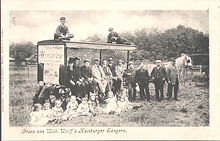Wilhelm Wolff (composer)
Wilhelm Wolff (born October 29, 1851 in Berlin ; † December 6, 1912 there ) was a German composer, comedy and couplet poet . Among other things, he created the hit song Is there no chair for my Hulda and the Finsterwalder singer song .
life and work
Wolff appeared as an instrumental humorist and around 1897 became director of the Hamburg singer's gentlemen's society founded in 1896 . These, provided with an “art certificate from the royal government”, operated primarily in Berlin . In 1899 Wolff used the name of the place Finsterwalde for his burlesque in 14 scenes about the singers from Finsterwalde . The eponymous couplet was sung in public for the first time as part of the farce on September 3, 1899 in the Germania splendid halls at Chausseestrasse 110 in Berlin and had its refrain
Man, if worry grabs
you, don't let yourself be subdued;
if your rind cracks too,
you have to sing, sing!
Immediately great success - initially not to the delight of the residents of Finsterwalde, who felt offended by the numerous caricatures that were created in the wake of the song. In the chorus he is said to have taken notes from Mendelssohn's song "Leise sucht durch mein Gemüt" without citing the source. Wolff worked on the successful piece of music and added the humorous march We Are the Singers of Finsterwalde as Opus 266 to his works, Robert Bachhofer made military music out of it and Otto Hefner set it as a male choir. Otto August Rothe's version was particularly popular in Finsterwalde itself, although it turned out in the 1970s that he had collected royalties by pretending to be the author of the text and melody of the piece. The piece was performed again in 1999 on the Finsterwalde market square.
The popular hit, based on a mazurka by Louis Ganne , became similarly popular Is there no chair for my Hulda from 1895, which the singer Willy Wenzke , known as "sweet Willy" according to Karl Kraus , interpreted.
Wilhelm Wolff got into financial difficulties when the men's singing societies went out of fashion and shot himself on December 6, 1912 in a stairwell in Berlin-Kreuzberg .
Individual evidence
- ↑ Information from the Finsterwalde City Museum from July 25, 2011
- ↑ a b Dirk Bunsen: The Singers from Finsterwalde ( Memento from February 11, 2013 in the web archive archive.today ) , Märkische Oderzeitung , around 2008
- ↑ The incredible story. The Finsterwalder Singer Festival ( Memento from November 24, 2011 in the Internet Archive ) , homepage of the Finsterwalder Singer Association
- ↑ History of well-known pieces of music on Muellerscience.com
- ↑ Karl Kraus: In this great time? , Excerpt (Chapter 11) on spiegelonline.de
- ↑ The Singers of Finsterwalde: In the beginning was the word ; in-berlin-brandenburg.com
- ↑ The Finsterwalder singers landed the hit of the season in 1899 , Lausitzer Rundschau , December 6, 2008; Retrieved July 28, 2012
| personal data | |
|---|---|
| SURNAME | Wolff, Wilhelm |
| BRIEF DESCRIPTION | German composer and couplet poet |
| DATE OF BIRTH | October 29, 1851 |
| PLACE OF BIRTH | Berlin |
| DATE OF DEATH | December 6, 1912 |
| Place of death | Berlin-Kreuzberg |

